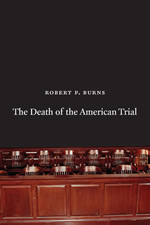The American trial’s vanishing act

Fifteen years ago this month, police in California charged O. J. Simpson with murdering his former wife and her friend, then chased him for about 50 miles before he surrendered, starting a process that would lead to one of the most famous trials in recent memory.
As Robert Ferguson reminds us in The Trial in American Life, an estimated 150 million Americans, the largest TV audience ever, watched the verdict, which arrived “only after thirteen months of media frenzy.” These excesses were, well, particularly excessive—but they are not unique. In his fascinating investigation of prominent trials in American history, Ferguson points out that “media frenzies during noteworthy trials have become such a staple of our times that dozens of instances will come to mind.”
But despite its cultural prominence, the trial is, in reality, almost extinct. In 2002, less than 2 percent of federal civil cases culminated in a trial, down from 12 percent forty years earlier. And the number of criminal trials also dropped dramatically, from 9 percent of cases in 1976 to only 3 percent in 2002. In his new The Death of the American Trial, Robert Burns warns that this decline could lead not only to the loss of a vaunted institution, but also to the dangerous erosion of American democracy.
Discussing his book in a recent post, the Virginia Quarterly Review blog noted that
high-profile lawsuits with a controversial verdict—the OJ Simpson trial, for example—may have affected social perceptions about the value of decisions delivered by jury, but as Burns demonstrates in his book, the trial is actually a fundamental component of American democracy.… The 20th century has left us with a legacy of famous trials and Supreme Court verdicts that have shaped our history as a country. As we move into the 21st century with even greater challenges ahead, let us hope that this part of our legal system does not come to exist only in television reruns.